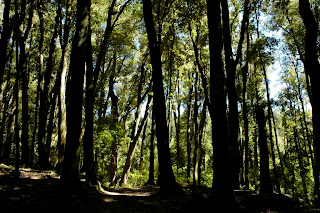Not Just Any Forest
I am fortunate to have had a grandfather who owned an old growth forest. During his 90 years of life, my grandfather cared for the ancient forest by leaving it virtually undisturbed, adding just a narrow dirt road that wound around the large trees so as not to cut them with barely enough space for a single car to pass.
This forest grows next to a large glacial lake just opposite a volcano in the south of Chile. The forest is composed primarily of native trees up to 400 years old. These trees are not conifers. They are deciduous trees that grow 60, 80, 100 and more feet high. He called this forest “Los Raulies” after a particularly tall and beautiful native tree that grows only in this area.
This land was occupied long before the Spaniards first arrived in Chile in 1536. The Mapuche are a proud and fierce people that held off the Spanish from this area for over 300 years. Mapuche means “People of the Earth” in their language, and they call the volcano that overseas this region “Rucapillan”, which translates literally as the “House of God”. In a deep part of my grandfather's forest are the remnants of an old Spanish fort which today is little more than the depression of a moat and some coins, metal fragments and other artifacts. The Spanish soldiers cleared the area around the moat cutting those beautiful trees to build their fort. They would have had a beautiful view of Rucapillan, but it is hard to say whether they appreciated its beauty. These Spaniards came looking for gold and they renamed the volcano “Villarrica” which means “Rich Town” in Spanish taking the name of a small settlement nearby, which is ironic since they never found much gold. The Spaniards were killed or driven out in 1554 by the Mapuche. Descents of these original Spaniards and other colonizing Europeans would not return to this land until 1883 when, using modern weapons, they killed or forcibly removed the Mapuche and placed them on reservations.
My great-great grandfather, a man of German descent, purchased some of this land. Now that my grandfather is gone, my father has inherited a part of this forest, and, like his father, he also intends to care for this land. To help look after the land, my father hired a caretaker whose name is Nelson Manquecoi. Nelson is Mapuche. His last name means the Condor and the Snake. His first name comes from the popular use of European names, especially English and German names since many settlers in the area came from northern Europe. Nelson is proud to be Mapuche, but the effects of European colonization have left him only a thin veneer of his original culture. He cannot speak Mapudungu, the Mapuche native tongue, and he knows little about his tribe, the Pehuenches (literally the People of the South). Chileans of European descent have not been kind to the Mapuche. Historically the Mapuche were treated as savages too brutal to make good slaves. Even today, many Chileans consider the Mapuche to be “backward”.
Nelson is a master carpenter able to build everything from beautiful, delicate furniture to an entire house, which he has done for my father. Instead of hiring him just as an employee, my father decided to make him a partner in the business of running the land and, together, they purchase non-native pine trees from other farms which they make into lumber. Nelson is not only in charge of the entire operation; he is a part owner. He buys the wood, sells the lumber, pays the salaries of the workers and manages the books. He is incredibly hardworking, prompt, diligent, and he has a sense of personal integrity and pride that would never allow him to cheat anyone out of a single penny. Nelson, his wife and two daughters live in a house that he built right next to the one that he built for my father.
I studied the intense conflicts between Europeans and Native Americans when I was a child in school. I thought that I was studying history. I did not realize until very recently that that history continues today and that my family and I are integral parts of that often inhumane relationship. Like the relationship that we have with the environment, including the old growth forests, we European descents remain entangled in an abusive relationship with Native Americans that was born of a false sense of supremacy and conquest that we thought gave us the right to take and expropriate anything and everything for our own purposes.
Little did we understand that we were stealing from ourselves. When we destroy the old growth forests, we are stealing our children's future and perhaps cutting down the very trees that help maintain our climate and could help produce medicines to help us. When we oppress Native Americans, we are denying ourselves the opportunity to create a new culture that blends the best of the Old World and the New World. My father's rare act of working side by side with a wonderful Mapuche represents one minuscule step in returning so much that was taken away from them.
There is archaeological evidence in Chile that today's Native Americans arrived in boats that crossed the pacific approximately 15,000 years ago. If that proves to be correct, that means that Nelson Manquecoi and his ancestors have probably lived side by side with the native Rauli trees of the region for at least 150 centuries. I, for one, intend to listen to what Nelson tells me about these trees while I immerse myself in the sights, sounds and smells of the deep forest.





1 comment:
Great summary of the family involvement in Forest stewardship thousands of miles away on the other hemisphere.
REDatLongBeach
Post a Comment